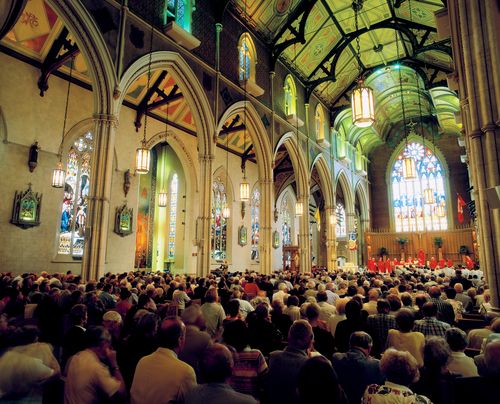 While it is inspiring to see how countless religious groups across faiths are rising to the challenge of adapting to the situation brought on by the novel coronavirus, groups that continue to gather can still be a cause for concern. In an effort to flatten the curve, many countries have cut out all but the most essential of gatherings. Religion is a point of contention, creating a gray area that can be difficult for governments to navigate. Are religious groups that continue to meet exercising their right to religious freedom, or simply being irresponsible?
While it is inspiring to see how countless religious groups across faiths are rising to the challenge of adapting to the situation brought on by the novel coronavirus, groups that continue to gather can still be a cause for concern. In an effort to flatten the curve, many countries have cut out all but the most essential of gatherings. Religion is a point of contention, creating a gray area that can be difficult for governments to navigate. Are religious groups that continue to meet exercising their right to religious freedom, or simply being irresponsible?
What Many Groups Are Doing Right
Using religion as a source of strength and healing can help spark hope among faithful communities. Many groups have even seen growth as more people turn to religion to guide them through the pandemic. Online resources such as church service via video streaming have become increasingly prominent, but what about groups that have done everything they can to stay open? There are a few things many churches are doing to try and keep people safe despite opening their doors.
Strategies to prevent infection include limiting the number of people who can come into the place of worship at a time and spacing families out between seats or pews. While these measures are better than nothing, it can be debatable how successful they really are, as airflow through many enclosed spaces may still cause the virus to spread at a distance further than 6 feet. Face masks may be a tool to further cut down on the risks, but in reality, there is no entirely sure way to keep people safe except to have them stay at home.
What Some Groups Are Doing Wrong
Despite the successes of groups that have changed the way they worship during the COVID-19 pandemic, some groups continue to disregard social distancing guidelines to a dangerous extent. They generally claim that religion is an essential service that must be allowed to continue. One of the major arguments made by religious worshippers who continue to participate in large gatherings is that they are protected from the virus through their faith. For example, Christians may quote certain verses from the Bible to make the point that God will protect them so long as they are worshipping; however, others argue that these ideas are taken too far out of context and that science must also be used to keep churchgoers safe.
What the Consequences May Be
The most immediate risk of continued meeting is the spread of the novel coronavirus among at-risk members. Many churches have a large population of older individuals who may be in danger of serious complications or death should they catch the virus. Of course, there is also the high potential of spread beyond the church itself to the wider community surrounding it and the world as a whole. These risks are why many people argue that it is irresponsible for people to continue to meet for church.
While it is true that religion has done a lot of good for many people during the pandemic, there are some safety issues in any circumstance where a lot of people still gather. The efforts of many groups to continue to practice their faith while staying apart can be applauded, but there are still some that continue to push the limits. Both types of responses can be seen across religions of all kinds. While there is no sure answer what the best solution is, it seems that being adaptable and making adjustments have served individual churches better than if they had stuck to their routines, both in keeping their members healthy and in spreading a positive message of staying together while staying apart.



